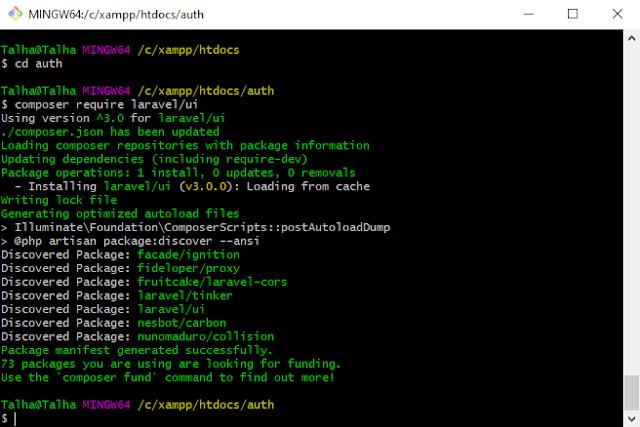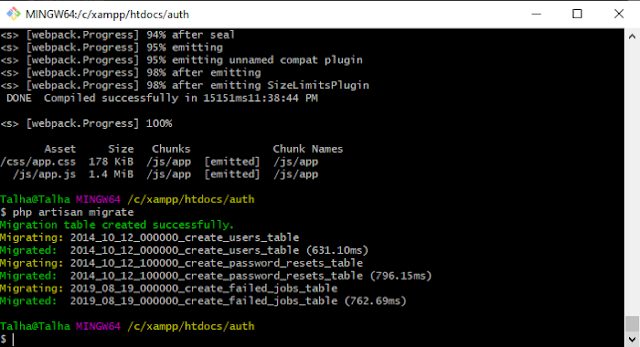There are 8 simple steps for laravel 8 authentication:
- Create a laravel 8 project
- “Laravel UI” package installation
- “Auth scaffolding” Generation
- “NPM” dependencies installation
- Setup the database
- Changings in a file
- Migration
- Test the project
1- Create a laravel 8 project
First, we've to create a laravel project. To create a new project open the ‘git bash’ in the ‘htdocs ’ folder, make sure the folder path ‘C:\xampp\htdocs’ in git bash. Now type the following command in git bash to create a new project:
composer create-project laravel/laravel=8.0 auth
If you do not want to mention the laravel version then simply remove the “=8.0”, in this case, the composer will automatically install the latest version of laravel. ‘auth’ is the project name.
2- “Laravel UI” package installation
Once the project is created, Now change the folder address by typing:
cd auth
or open the git bash by right-clicking inside the folder ‘auth’ and then execute the following command to install the laravel UI package:
composer require laravel/ui
3- “Auth scaffolding” Generation
After successfully installation of laravel UI package now execute the following command to scaffold the auth with vue, bootstrap or react, etc.
php artisan ui vue — auth
php artisan ui bootstrap --auth
4- “NPM” dependencies installation
In the final step, execute the following command to make frontend more attractive and beautiful:
npm install && npm run dev
If you found the error ‘bash: npm: command not found’
Then download and install the node.js pre-build install: https://nodejs.org/en/download/
and again execute this command.
5- Setup the database
Run the localhost and open the phpmyadmin and create a new database
Now open the project folder in an editor and open the .env file and change the ‘DB_DATABASE’ name to your database name:
6- Changings in a file
Open the AppServiceProvider.php file in ‘app/providers/AppServiceProvider.php’:
Add ‘use Illuminate\Support\Facades\Schema;’ outside of the class and type ‘Schema::defaultStringLength(191);’ in the boot function.
7- Migration
Now save all the files and type the following command in the git bash and press enter:
php artisan migrate
8- Test the project
Laravel authentication is successfully created. Now run the project on a localhost server ‘http://localhost/auth/public/’:
Click on the ‘Register’ button for registration and add you details and click register:
And you're logged in:
















0 Comments